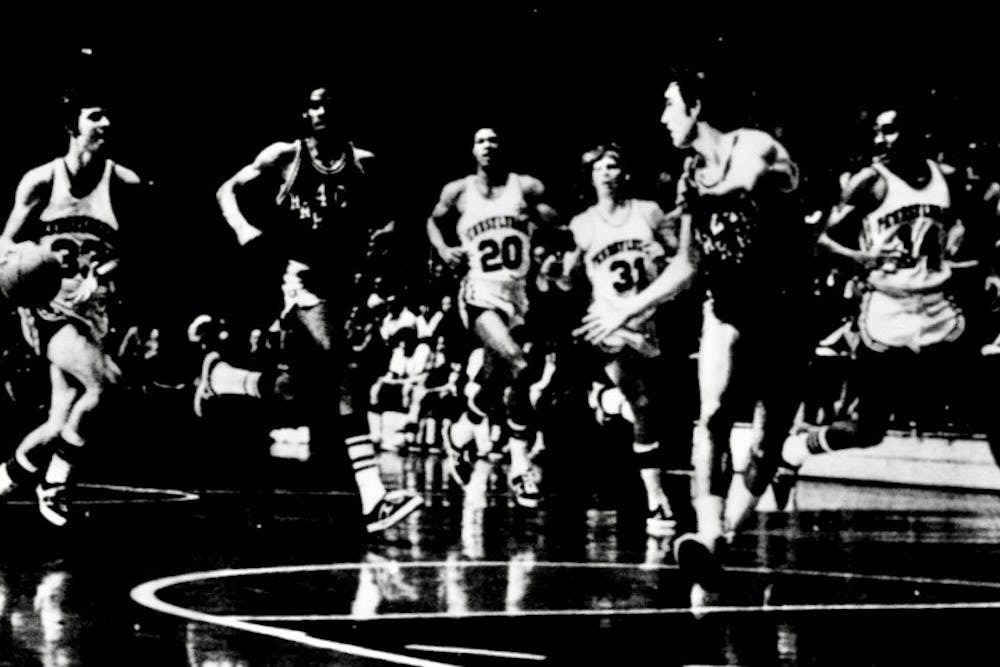Fans of Penn men’s basketball were spoiled by 1973, with three Ivy League titles in the past three seasons. And it didn't end there.
The Quakers had lost only one game at the Palestra since 1970, and coming off an undefeated 1970-71 regular season, head coach Chuck Daly had picked up the pen right where previous coach Dick Harter had left off.
But with the departure of co-captains Corky Calhoun and Bob Morse, Daly would turn towards the accomplished sophomores during his second season at Penn — and perhaps another talent yet to fully emerge from the shadows.
"Last season marked the end of an era,” Daly said. "At this point, this year’s club is totally an unknown quantity.”
Daly foresaw that small forward Phil Hankinson would step up as Penn's central player. The senior was an All-American candidate with the second-highest scoring average on the team the previous year, and had immense defensive abilities that had him guarding even the biggest opponents. Hankinson had lingered under the radar in past seasons, but now he would shoulder the role of team leader with co-captain Craig Littlepage.
“I feel that Phil has been playing within himself up until now," Daly said. "He’s been totally unselfish, but he’ll blossom this year."
The Quakers opened the season against King’s College with a 40-point win, a result of Daly’s increased attention on defending.
“Up to now we’ve spent at least 70 percent of our practice time on defense, and we’ll still be practicing it tomorrow,” Daly said after the game.
The Quakers’ first losses of the season came consecutively during the holidays — away at Cincinnati and at San Francisco in late December.
Penn rectified its record in the new year with low-scoring wins in the Ivy League. They toppled Dartmouth, Harvard, and Princeton in stubborn, defensive tie-downs.
To Daly’s expectations, the sophomores stepped up as well. In the second half against archrival Villanova, the sophomores came off the bench to frustrate the Wildcats with persistent pressure on defense while continuing to score. Penn eventually triumphed in a 77-69 victory, and by then, Hankinson’s 24 points and 10 rebounds felt routine.
In late January, the Quakers clinched their third-ever Big 5 title after sailing past La Salle, 57-45.
However, the Quakers slipped again in their showdown against Princeton. Their loss on the Tigers' home turf the previous season had been their only Ivy defeat in over three years, but this time the contest was lost at home.
Penn bounced back immediately with four consecutive wins in the Ivy League, including the game against Brown when Hankinson reached 1,000 career points.
“I’m not overly impressed by it,” Hankinson said. “A lot of guys have done it. But I guess it’s still something to be proud of.”
Right before walking out on the closing game of the regular season, Daly decided to make some changes to his lineup. He chose the five seniors on the team — Hankinson, Littlepage, Steve Batory, Bruce Fields, and Keith Hansen — as the starting quintet against Dartmouth for their final appearance at the Palestra.
In the Quakers’ first game of the NCAA Tournament, Penn held its ground against St. John’s to slip past the Red Storm in a 62-61 win. The Quakers' structured, disciplined style of play and a steadfast defense dampened St. John's from scoring, keeping it well below its average of 87 points per game.
If there is one moment to still remember from that game today, it is the unexpected 20-foot shot by John Jablonski that tipped the scales towards Penn for the rest of the second half.
“That was the icing on the cake,” said sophomore Ron Haigler, who led the Quakers in scoring that night with 20 points.
“Icing?” Jablonski replied. “That was the main course. That was the meat!”
Unfortunately, the 18th-ranked Quakers’ postseason run concluded at the feet of fourth-ranked Providence at the Charlotte Coliseum.
Penn could not track the pace of Providence’s fast-break offense, and the Friars’ lead from halftime only stretched wider until the final whistle. The Friars shot 65 percent from the field; Penn mustered just 33.7 percent.
“I think we outhustled them, but they just shot better,” Littlepage said.
“The key was DiGregorio and Barnes and our poor shooting,” Hankinson said, referring to the top scorers for Providence. “That was it.”
Another loss to Syracuse in the third-place consolation match staked Penn's final record at 21-7, falling short of the 25-3 mark notched the season prior.
With the departure of Hankinson and Littlepage after the 1972-73 season, the last remnants of the Dick Harter era were gone. The succeeding generation in Penn men’s basketball would be entirely in Daly’s hands.









